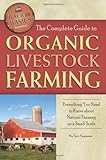Living Organic Online Store
The Winter Harvest Handbook: Year Round Vegetable Production Using Deep-Organic Techniques and Unheated Greenhouses
Choosing locally grown organic food is a sustainable living trend that’s taken hold throughout North America. Celebrated farming expert Eliot Coleman helped start this movement with The New Organic Grower published 20 years ago. He continues to lead the way, pushing the limits of the harvest season while working his world-renowned organic farm in Harborside, Maine.Now, with his long-awaited new book, The Winter Harvest Handbook, anyone can have access to his hard-won experience. Gardeners and farmers can use the innovative, highly successful methods Coleman describes in this comprehensive handbook to raise crops throughout the coldest of winters.Building on the techniques that hundreds of thousands of farmers and gardeners adopted from The New Organic Grower and Four-Season Harvest, this new book focuses on growing produce of unparalleled freshness and quality in customized unheated or, in some cases, minimally heated, movable plastic greenhouses.Coleman offers clear, concise details on greenhouse construction and maintenance, planting schedules, crop management, harvesting practices, and even marketing methods in this complete, meticulous, and illustrated guide. Readers have access to all the techniques that have proven to produce higher-quality crops on Coleman’s own farm.His painstaking research and experimentation with more than 30 different crops will be valuable to small farmers, homesteaders, and experienced home gardeners who seek to expand their production seasons.A passionate advocate for the revival of small-scale sustainable farming, Coleman provides a practical model for supplying fresh, locally grown produce during the winter season, even in climates where conventional wisdom says it “just can’t be done.”
Related Products
Your Farm in the City: An Urban-Dweller's Guide to Growing Food and Raising Animals
The most complete book on urban farming, covering everything from growing organic produce and raising chickens, to running a small farm on a city lot or in a suburban backyard. Eating locally and growing one's own food is a rapidly evolving movement in urban settings - Hantz Farms in Detroit has transformed 70 acres of abandoned properties into energy-efficient gardens, and Eagle Street Rooftop Farm, a 6,000-foot vegetable farm in Brooklyn, New York, yields 30 different kinds of produce, while private square-foot farms are cropping up in cities all over the country. Created by Lisa Taylor and the gardeners of Seattle Tilth, "Your Farm in the City" covers all of the essential information specific to gardening and farming in a city or town. Clear, easy-to-follow instructions guide and inspire even the most inexperienced urbanite in how to grow and harvest all types of produce, flowers, herbs, and trees, as well as how to raise livestock like chickens, ducks, rabbits, goats, and honeybees. Important information particular to gardening in a city or town is included, such as planning and maximizing limited space, building healthy soil, managing irrigation, understanding zoning laws, outwitting urban pests, and being a considerate farming neighbor. With 100 two-color instructional illustrations throughout and dozens of vital resources, Your Farm in the City is the most practical, comprehensive, and easy-to-follow guide to the burgeoning trend of urban farming.
Agrarian Dreams: The Paradox of Organic Farming in California (California Studies in Critical Human Geography)
In an era of escalating food politics, many believe organic farming to be the agrarian answer. In this first comprehensive study of organic farming in California, Julie Guthman casts doubt on the current wisdom about organic food and agriculture, at least as it has evolved in the Golden State. Refuting popular portrayals of organic agriculture as a small-scale family farm endeavor in opposition to "industrial" agriculture, Guthman explains how organic farming has replicated what it set out to oppose.
The Complete Guide to Organic Livestock Farming: Everything You Need to Know about Natural Farming on a Small Scale (Back-To-Basics Farming)
Small scale farming has grown greatly in popularity during the last two decades, with a greater turn in public awareness toward locally grown, organic, grass fed products that have not been modified, chemically altered, or poorly fed. For that reason, those looking to start a small scale farm and raise livestock have a greater chance than ever before to take advantage of the new market for small scale goods. This book will show any potential small scale farmer how to start raising their livestock and marketing it to the organic, natural lifestyle community that so fervently seeks out these products. You will learn how to start the basic outline for your new small farm, including which livestock to raise, how to build their pens and habitat, and what you will be feeding them to maintain a healthy, organic farm. You will learn the basics of animal husbandry, from genetics and breeding to feeding, building locations, and proper health and reproduction care. You will learn how to find yourself in the right niche for selling your products and what legalities you must see to as well as the butchering and processing phase Hundreds of hours of in-depth interviews have been conducted for this book with top experts in farm management to provide you with details about farm planning, financial planning, and proper livestock planning. A complete appendix will detail the various breeds and needs of cattle, chickens, goats, horses, pigs, and sheep to help you select the right livestock for your farm. In addition, you will learn the basic composition of most feeds, different grasses and legumes you can use, and find a plethora of outside resources to utilize. For anyone with dreams of a small farm and raising livestock in their future, this is a book for you.




